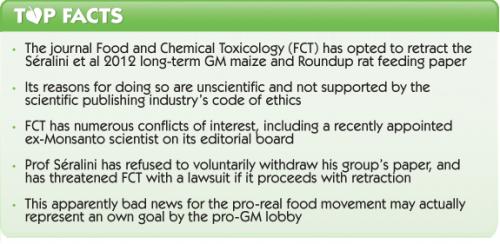Adam Smith
Science & communications officer, ANH-Int
So: the report of the controversial, long-term rat feeding study of Monsanto’s genetically modified (GM) NK603 maize and Roundup (glyphosate) herbicide, performed by Professor Gilles-Eric Séralini et al, is being retracted. This is a clearly politically motivated decision by the journal Food and Chemical Toxicology (FCT), unjustifiable on scientific grounds alone, that continues a shameful pattern of science bowing to corporate interests.

Corporate enemy number one
The increased tumour incidence and shortened lifespan of rats observed in the admittedly imperfect Séralini et al study revealed disturbing implications about the longer-term toxicity of both Roundup herbicide and NK603 Roundup-tolerant GM maize. The knives have been out for Séralini et al ever since.
To its credit, FCT had acted honourably up to this point. It published letters both critical and supportive of the Séralini et al paper and allowed the French researchers to answer their critics in print.
Double standards
Now, however, the FCT’s editor, Dr A Wallace Hayes, has opted to retract Séralini et al’s 2012 paper. In Dr Hayes’ retraction statement, he spoke of “Legitimate cause for concern regarding both the number of animals in each study group and the particular strain selected”. Séralini et al have previously dealt with these exact criticisms in detail. The crucial point here is that all Séralini et al essentially did was extend Monsanto’s 2004 rat feeding protocol – also published in FCT – across the rats’ entire lifespan, while adding an extra arm studying the effects of Monsanto’s herbicide that accompanies NK603 in the field, Roundup. In short, as Prof Séralini pointed out in his official response to Dr Hayes, “A factual comparative analysis of [our] rat feeding trial...and the Monsanto trials clearly reveals that if the Séralini experiments are considered to be insufficient to demonstrate harm, logically, it must be the same for those carried out by Monsanto to prove safety.” EFSA, perhaps the most influential of Séralini et al’s critics, appears quietly to agree.
Politics, not science
In his statement, Dr Hayes also stressed that “Ultimately, the results presented (while not incorrect) are inconclusive, and therefore do not reach the threshold of publication for Food and Chemical Toxicology.”
But hold on a minute. Science is surely an ongoing conversation between researchers, not a procession of definitive statements. When a paper is published that asks important questions or offers new avenues for further research, follow-up studies are performed and science moves on. That’s how it’s supposed to work, anyway – but as we’ve seen in cases like those of Dr Arpad Pusztai, Ignacio Chapela and David Quist, and Dr Judy Carman in the world of GM research, and Dr Andrew Wakefield elsewhere, the practice of science is all to easily derailed by corporate–governmental interests.
The scientific publishing industry even has guidelines, to which FCT is a signatory, specifying when retraction is appropriate. These clearly do not apply in the case of Séralini et al, as pointed out by the European Network of Scientists for Social and Environmental Responsibility (ENSSER).
Even Dr Hayes may appreciate the absurdity of the situation. In his retraction statement, he admits that his review of Séralini et al’s raw data “Found no evidence of fraud or intentional misrepresentation of the data”. We can only imagine his embarrassment at being forced to rely on the scientifically unsupportable ‘inconclusive results’ gambit to justify pulling the paper.
Corporate science at Elsevier?
Meet Richard E Goodman. Mr Goodman was appointed to a brand-new position at FCT – Associate Editor for Biotechnology – in early 2013, several months after Séralini et al was published. He also used to work for Monsanto and has ongoing links with the International Life Sciences Institute (ILSI), a notorious big business front group. Soon after Mr Goodman was parachuted onto the FCT board, the journal retracted two articles, including a Brazilian paper that questioned the safety of the Bacillus thuringiensis (Bt) toxin present in many GM crops. Furthermore, FCT’s conflicts of interest don’t end there, and Elsevier, FCT’s publisher, has form.
All in all, we agree 100% with GMWatch: the “Journal retraction of Séralini study is illicit, unscientific, and unethical”.
Put even more simply: it’s bad science.
What next for Séralini et al?
Prof Séralini is so far standing firm against this outrageous – although sadly commonplace – hijacking of the scientific process by big business. He is refusing to voluntarily retract the paper and has threatened a lawsuit against FCT if it withdraws the article.
Another option would be to get his data published elsewhere – exactly as the Brazilian researchers did. If successful, republication would not only demonstrate the integrity of Prof Séralini’s group’s research; it would also draw inevitable attention to FCT’s politically driven retraction.
The final piece of context may come from two forthcoming, long-term GM studies being funded by the European Commission and the French government. The French study in particular was inspired by Séralini et al, and it will be interesting to observe the organisers’ response to recent events.
Foot, meet bullet
As much as this episode looks like a severe blow to the anti-GM movement – actually the ‘pro-real food’ movement – it may be that the GM lobby has actually shot itself in the foot. The GM cat has been out of the bag for some time, and the latest twist in the Séralini affair makes it screamingly obvious that the biotech industry will go to any lengths to keep the public in the dark. A very public lawsuit will only assist that enlightenment process.
Whatever Prof Séralini opts to do next, we wish him well.
You can stay abreast of Prof Séralini’s work at www.gmoseralini.com.








Comments
your voice counts
19 December 2013 at 2:29 am
Nice attempt at twisting the truth. but you failed.6 French Academies have publicly questioned seralini's integrity. The U. of Perugia study says "no significany health risk" Millions of people and critters earing gmo foods--with no harmful effects. Liability attorneys have failed to sue gmo producers. Why. No evidence. You lose son.
20 January 2014 at 6:26 pm
Hi Anonymous, and thanks for your message. We’d say it’s beyond doubt that the only people who have twisted the truth are the pro-GM scientific and regulatory establishment and their pliant friends in the mainstream media.
For a start, the fact that there is an ongoing debate over GM - where a rapidly growing http://www.ensser.org/fileadmin/user_upload/signatories_as_of_131210_lv.pdf group of scientists with ecological backgrounds, such as the European Network of Scientists for Social and Environmental Responsibility (ENSSER), are voicing grave concerns - http://www.ensser.org/increasing-public-information/no-scientific-consensus-on-gmo-safety/ - is precisely because there is evidence of safety concerns with GM. The only losers, as far as we can see, are the general public who are consuming GM foods when the safety evidence is clearly inadequate.
To take your points in turn:
1. On the criticism from the six French academies, www.gmoseralini.org says: “A report purportedly from six French scientific academies was exposed as biased and unrepresentative by the academies’ statistics expert, Paul Deheuvels. According to Deheuvels, the academies’ membership as a whole was not consulted about the report, which was written by an anonymous group of experts “convened in an emergency, we do not know by whom, no one knows how, with a total lack of transparency in the selection of its members, and on the basis of two representatives from each academy”. You can read more here: http://gmoseralini.org/faq-items/what-about-the-government-agencies-that-rejected-the-study/
Also, ask yourself this: if the French establishment has so clearly rejected Seralini’s research, why is the French government investing millions in further work based on that very research? http://www.gmwatch.org/index.php/news/archive/2013/14858-france-launches-long-term-study-on-gmo-health-risks-ends-last-gmo-open-trial
2. It would be useful if you could clarify which University of Perugia article you’re referring to. We suspect it may be this one - http://www.geneticliteracyproject.org/wp/wp-content/uploads/2013/10/Nicolia-20131.pdf - since it concludes that “the scientific research conducted so far has not detected any significant hazard directly connected with the use of GM crops.” Even a very brief look at the paper reveals that the authors do not disclose any details of their inclusion criteria, merely stating “We selected original research papers, reviews, relevant opinions and reports addressing all the major issues that emerged in the debate on GE crops.” Elsewhere, they estimate that the GM crop safety literature included over 31,000 papers by 2006, so they’ve clearly done some serious pruning to arrive at their sample of less than 1,800! The authors dismiss Séralini et al largely by reference to the European Food Safety Authority’s (EFSA’s) highly dubious assessments - http://anhinternational.org/How_much_longer_can_the_biotech_industry_bury_GM_danger_signals - so we’d advise caution when drawing any conclusions from this particular Perugia paper.
3. It’s impossible to say that no harmful effects have occurred as a result of eating GM foods. Why? Because in the US - where GM foods have been widely consumed for around 30 years, making the population ideal for epidemiological study - GM foods aren’t labelled. Clearly, then, we can’t track how much and which GM products have been consumed, by whom, for how long and look for correlations with health outcomes. It is worth noting, however, that in the same time period the incidence of chronic diseases has skyrocketed in the US. While it’s not unreasonable to speculate that GM might be a contributing factor in rising chronic disease rates, it is both unreasonable and scientifically unsupportable to conclude that GM has been proven not to be involved.
4. None of the legal cases around GM crops have concerned health effects, so we’re not sure why you mention them in this context.
Finally, don’t forget that Séralini did not act alone: he headed up a team of researchers, working out of a respected academic institution, the University of Caen in France. It is it highly unlikely that an entire group of charlatans would be able to obtain funding, perform, write up and publish shoddy or fraudulent work in such an environment. Not only that, but the experimental would have been thoroughly examined before approval by the university’s ethics committee.
Your voice counts
We welcome your comments and are very interested in your point of view, but we ask that you keep them relevant to the article, that they be civil and without commercial links. All comments are moderated prior to being published. We reserve the right to edit or not publish comments that we consider abusive or offensive.
There is extra content here from a third party provider. You will be unable to see this content unless you agree to allow Content Cookies. Cookie Preferences